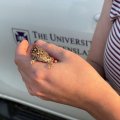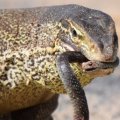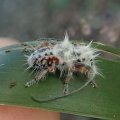UQ researchers are exploring the influence siblings may have on the social behaviour of autistic children.
PhD candidate in the School of Psychology, Karen O’Brien, said children with autism could have difficulties in social interactions and that their siblings played an important role in their development, particularly when it came to social skills.
“Children acquire the ability to identify mental states, also known as 'theory of the mind' (ToM), at around four years of age,” she said.
“Research has shown that children with autism typically struggle on ToM tests and their everyday ToM skills are impaired, making it rare for even the highest-functioning autistic child to pass these tests before the age of 13 years.”
Mental states identified in ToM include intentions, beliefs, desires and emotions, in oneself and other people, and understanding that everyone has their own plans, thoughts, and points of view.
According to Ms O’Brien, typically developing children show a significant advance in ToM understanding between the ages of three to five years.
Ms O’Brien said research showed that having child-aged siblings was positively associated with their ToM.
“As ToM is key to everyday social behaviour, it is important to extend this research to examine whether there are similar sibling effects for children with autism spectrum disorders (ASD),” she said.
The study involved 60 children, ranging from three to 13 years, who had been clinically diagnosed with ASD.
Using a number of ToM tests, the study assessed the childrens’ ability to sense the state of mind of another person and understand their point of view.
Although previous research suggested the presence of one or more siblings in the home was positively associated with ToM in typically developing children, the findings in this new study were different.
The UQ study showed that children with ASD who had younger siblings performed well on ToM tests.
The data also suggested that having older siblings had a detrimental effect on ToM development for the children with ASD.
Ms O’Brien said older siblings might over-compensate for their younger ASD siblings in social interactions, thereby limiting opportunities for social growth.
“Parental attitudes, family resources, cultural norms and access to educational interventions may also be relevant and clearly warrant further research.
“Our results indicate that sibling interaction may be both more frequent and more significant for children with autism when the sibling is younger than the child with ASD, rather than in the case of an older, typically developing sibling who might behave more like a parent,” she said.
Ms O’Brien and her co-authors, Professors Virginia Slaughter and Candida Peterson published this work in the latest edition of the Journal of Child Psychology and Psychiatry.
Media enquiries: Karen O’Brien 0430 063 355, k.obrien@psy.uq.edu.au or Kristen Bastian at UQ Communications: +61 7 3346 9279, k.bastian@uq.edu.au










